Terrorism and Modern Literature
From Joseph Conrad to Ciaran Carson
Format:Hardback
Publisher:Oxford University Press
Published:12th Sep '02
Currently unavailable, and unfortunately no date known when it will be back
This hardback is available in another edition too:
- Paperback£51.00(9780198187714)

Writing terrorism in the modern world - a fresh perspective on terrorism's cultural aftermath
Ranging from the 1880s to the 1980s and examining occurrences of terrorism as diverse as the literary writings on it, Terrorism and Modern Literature offers a fresh perspective on terrorism's cultural effects, as well as on modern literature's historical and political dimensions, and is the first extensive study of modern literature's engagement with terrorism.Is terrorism's violence essentially symbolic? Does it impact on culture primarily through the media? What kinds of performative effect do the various discourses surrounding terrorism have? Such questions have not only become increasingly important in terrorism studies, they have also been concerns for many literary writers. This book is the first extensive study of modern literature's engagement with terrorism. Ranging from the 1880s to the 1980s, the terrorism examined is as diverse as the literary writings on it: chapters include discussions of Joseph Conrad's novels on Anarchism and Russian Nihilism; Wyndham Lewis's avant-garde responses to Syndicalism and the militant Suffragettes; Ezra Pound's poetic entanglement with Segregationist violence; Walter Abish's fictions about West German urban guerrillas; and Seamus Heaney's and Ciaran Carson's poems on the 'Troubles' in Northern Ireland. In each instance, Alex Houen explores how the literary writer figures clashes or collusions between terrorist violence and discursive performativity. What is revealed is that writing on terrorism has frequently involved refiguring the force of literature itself. In terrorism studies the cultural impact of terrorism has often been accounted for with rigid, structural theories of its discursive roots. But what about the performative effects of violence on discourse? Addressing the issue of this mutual contagion, Terrorism and Modern Literature shows that the mediation and effects of terrorism have been historically variable. Referring to a variety of sources in addition to the literature--newspaper and journal articles, legislation, letters, manifestoes--the book shows how terrorism and the literature on it have been embroiled in wider cultural fields. The result is not just a timely intervention in debates about terrorism's performativity. Drawing on literary/critical theory and philosophy, it is also a major contribution to debates about the historical and political dimensions of modernist and postmodernist literary practices.
As Alex Houen argues in his important book, Terrorism and Modern Literature, it is time to look more closely at "how the figurative has been imbricated in terrorism's events and history in complex, material ways". * Margaret Scanlan, Modern Philosophy *
The chapter on Pound illustrates the theoretical sophistication and detailed research characteristics of Houen's book...anyone with a stake in the power of literature in the world will learn from this carefully reasoned and impeccably researched book. * Margaret Scanlan, Modern Philosophy *
Terrorism and Modern Literature resists generalized accounts of terrorism that either gloss over historical detail or ignore the impact of violence on people's lives. * Andrzej Gasiorek, Textual Practice *
[An] important book. anyone with a stake in the power of literature will learn from this carefully reasoned and impeccably researched book. * Margaret Scanlan, Modern Philology 103:1 (2005) *
It is to its considerable credit that [Terrorism and Modern Literature] neither exploits nor manifestly fails the challenge of its own moment in the political and cultural history which its main title denominates. For this study constructs an account that fits events of [11 September 2001] as no exception, rather as an all-too-logical consequence and extension of pressures escalating in the intellectual and political culture of the preceding century. The steady exposition that Alex Houen conducts of developments in particular in the scientific thinking of the nineteenth and twentieth centuries offers an illuminating, useful heuristic for the growing dominance of the extreme-case option as a means of effecting political (usually 'anarchist') agendas. * Vincent Sherry, Modernism/Modernity 11: 2 (2004) *
[A] timely and challenging book. ambitious and scholarly, encouraging new readings of the cultural impact of terrorism, the media's complicity, and the ways in which responses to political violence have necessitated new literary approaches. compelling and original. * Douglas Field, The Cambridge Quarterly 33:1 (2004) *
Analysis of terrorism must attend to the interplay between representation and reality because all that most of us will ever know about it will be mediated. A major virtue of Alex Houen's ambitious book lies in its insistence on this issue. * Andrzej Gasiorek, Textual Practice 17:3 (2003) *
... intriguing and timely book. * English Literature in Transition *
ISBN: 9780198187707
Dimensions: 224mm x 145mm x 23mm
Weight: 567g
320 pages